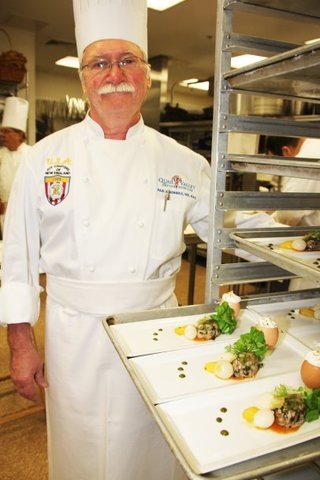I’ve been thinking about an important question lately: a question that is the foundation of our purpose as educators. The question is simple – what should we be doing? On the surface, the answer is easy – we are training students to be competent cooks and teaching them to understand the why of cooking. But I know we all believe our job is so much more complex than that.
We are, or at least should be, preparing students for life. I realize we are not solely responsible for this monumental task, but, nevertheless, it is part of our job description (and it may be an unwritten part). How we go about this will vary, but understanding that we carry this responsibility may make us think differently about how we approach each class, kitchen lab, assignment, internship, etc. What are the aspects of a successful life we can impact? Here are a few ideas to chew on and digest:
Caring about others
Showing students how to see the impact of their decisions and actions on others and learning how others feel is a good start. This empathy need not be viewed as being soft or weak; it is a sign of strength. Instructors should point to ways of caring can be enlightening.
Maintaining a healthy lifestyle
I remember a 5th grade math teacher who started every class by opening the windows and guiding us through five minutes of stretching and breathing exercises. Her hope was to instill this as a habit we would have through life, a way to care for our bodies and minds leading to a more effective way to learn. Could we integrate a few moments at the beginning of each class to care for our physical and mental wellbeing?
Being aware of an action’s impact on the world
Taking a moment in class to discuss those human actions and inactions that impact others through food can be a lightbulb moment for many. Talking about the challenges farmers face, the food distribution system, food insecurity and hunger, centralized vs. decentralized farming practices, and environmental challenges, not from a political standpoint, but rather a factual presentation of the challenges these future chefs will face.
Remaining humble
We are preparing students to be successful and great at what they do but demonstrating they should recognize when their success is accomplished as part of something larger than the individual. Ego may push certain people to excel, and ego is fine unless it ignores others who contribute to anyone’s level of success. Spend adequate time in classes pushing for team dynamics.
Knowing “we” leads to success more than “me”
Celebrate a team, because teams are at the core of every successful food business. Invest in team activities and assignments and grades with that in mind.
See opportunity in challenges
Allow students to make mistakes but show them how they might turn those mistakes into challenges that stretch their skills and understanding. Set the stage for opportunities to correct, resolve, learn and turn lemons into lemonade.
Planning by asking “What if?”
Create ample opportunities for scenario planning in class. Asking “What if?” is a very effective planning tool that can be used to prevent rather than always trying to correct.
Removing mediocrity from their everyday actions
There should be no room for mediocrity in your classes. Push and pull students to give their best to every task and teach them to never accept anything from themselves or others that fails to seek excellence.
Get involved
Encourage students to be present, take a stand, organize and join efforts that will improve their quality of life or the quality of life for others. The leaders of tomorrow are the involved of today.
Learning the difference between criticism and critique
Educators should never criticize students by pointing out poor performance or results without helping the person find ways to improve. Critique always includes the elements of explaining, showing and celebrating. Show them the way through your own actions and they will follow.
PLAN BETTER – TRAIN HARDER
Paul Sorgule, MS, AAC, president of Harvest America Ventures, a mobile restaurant incubator based in Saranac Lake, N.Y., is the former vice president of New England Culinary Institute and a former dean at Paul Smith’s College. Contact him atThis email address is being protected from spambots. You need JavaScript enabled to view it..
